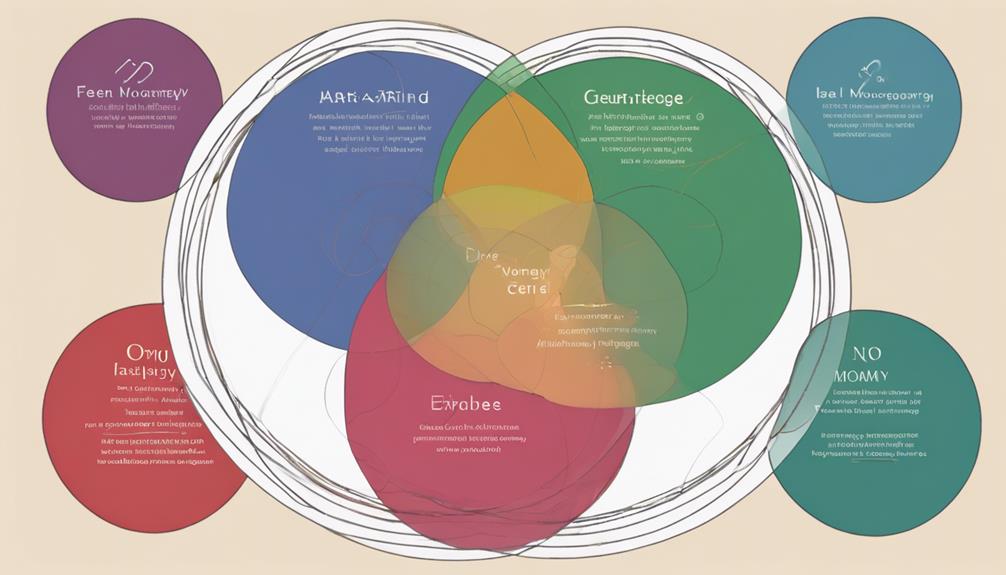Some may argue that ethical non-monogamy challenges the traditional societal expectation of monogamous relationships, but it is a legitimate and mutually agreed upon way to establish intimate connections that emphasizes openness and communication. Delving into the world of ethical non-monogamy can enhance one’s comprehension of personal wants, requirements, and limits within relationships.
By embracing ethical non-monogamy, individuals may find a sense of liberation and fulfillment that traditional monogamy might not offer. Understanding the nuances of ethical non-monogamy can open up a world of possibilities for those seeking relational authenticity and emotional growth.
Key Takeaways
- Ethical non-monogamy prioritizes open communication, consent, and transparent agreements for diverse relationship dynamics.
- It allows individuals to explore multiple romantic connections, catering to diverse emotional and sexual needs.
- ENM fosters understanding, empathy, and respect, nurturing deep emotional connections with honesty and sensitivity.
- Various forms like polyamory and relationship anarchy offer opportunities for fulfilling personal values and desires authentically.
Understanding Ethical Non-Monogamy
In exploring the realm of ethical non-monogamy, it's crucial to understand the foundation of open communication and mutual agreement among all individuals involved. In ethical non-monogamous relationships, people prioritize honest and transparent communication with their partners. This open dialogue allows for a consensual understanding of boundaries, desires, and expectations within the relationship. Each partner plays a crucial role in shaping the dynamic of the relationship by expressing their needs and actively listening to their partners' perspectives.
Emotional connections are a significant aspect of ethical non-monogamy, where individuals can form romantic bonds outside of their primary partnership with consent. These emotional connections can vary in intensity and may bring fulfillment and growth to all parties involved. It's essential to navigate these connections with sensitivity and empathy, ensuring that all individuals feel valued and respected throughout the relationship.
Consent is the cornerstone of ethical non-monogamy, emphasizing the importance of mutual agreement without coercion or deceit. By prioritizing open communication and respecting each other's boundaries, people can cultivate healthy and fulfilling relationships within the realm of ethical non-monogamy.
ENM Vs. Traditional Monogamy

When comparing Ethical Non-Monogamy (ENM) to Traditional Monogamy, individuals navigate contrasting relationship dynamics and expectations.
- Diverse Relationship Dynamics: Ethical non-monogamy allows for connections beyond the traditional exclusive commitment of monogamy, enabling individuals to explore varied relationship structures that suit their needs.
- Open Communication and Transparency: Unlike the often implicit expectations in traditional monogamous relationships, ethical non-monogamy thrives on open communication and transparency among all partners, fostering trust and understanding.
- Meeting Varied Emotional and Sexual Needs: Ethical non-monogamy acknowledges that individuals have diverse emotional and sexual needs that may not be fulfilled by a single partner. It offers the freedom to explore connections with multiple partners while ensuring all parties are aware and consenting.
In this comparison, ethical non-monogamy challenges the societal norm of exclusive monogamous relationships by promoting honest communication, respect, and consent. It provides individuals with the opportunity to navigate relationships in ways that cater to their complex emotional and sexual needs, fostering a deeper sense of fulfillment and connection.
Reasons for Choosing ENM
Choosing Ethical Non-Monogamy (ENM) often stems from a desire to embrace diverse sexualities and relationship dynamics. For many individuals, ENM provides a platform to explore and express their sexual identity in ways that traditional monogamous relationships may not accommodate. The appeal of loving multiple partners simultaneously is a driving force for those who opt for ENM, as it allows them to form deep connections with different individuals based on shared interests and compatibility.
ENM becomes a choice for some when certain needs can't be entirely fulfilled within the confines of a single relationship. The freedom to pursue diverse relationship dynamics outside the primary partnership can lead to a more fulfilling and enriching experience for those involved. By engaging in ethical non-monogamy, individuals can cultivate a deeper understanding of themselves and their partners, fostering a sense of openness and honesty within their relationships. Ultimately, the decision to choose ENM is deeply personal and reflective of one's values, desires, and aspirations in the realm of intimate connections.
Different Types of ENM

Exploring ethical non-monogamy reveals a spectrum of relationship structures that cater to diverse preferences and values.
- Polyamory: Involves engaging in multiple romantic or intimate relationships with the consent of all parties involved, emphasizing emotional connections with multiple partners.
- Monogamish: Typically involves a mostly monogamous couple who occasionally engage in relationships with others, allowing for flexibility within the boundaries of their primary relationship.
- Relationship Anarchy: Values all relationships equally, rejecting the prioritization of romantic connections over platonic ones, promoting autonomy and individual agency in forming connections.
These different types of ethical non-monogamous relationships offer individuals the freedom to navigate diverse forms of romantic and intimate connections based on their values and desires.
Whether it's exploring multiple romantic relationships through polyamory, maintaining a primary partnership with occasional outside connections in monogamish setups, or embracing Relationship Anarchy's rejection of hierarchical structures, the landscape of consensual non-monogamy provides a rich tapestry of possibilities for those seeking alternative ways to engage in relationships.
Practicing Ethical Non-Monogamy
To successfully practice ethical non-monogamy, establishing and maintaining clear boundaries and open communication with all partners is essential. Boundaries and rules should be set to ensure that everyone involved understands each other's needs and expectations, fostering respect and trust within the relationships.
Regular and honest communication is key to maintaining transparency and alignment among partners, allowing for a deeper connection and understanding of each other's emotions. Prioritizing honesty and openness in all interactions helps build a foundation of trust that's crucial for the success of ethical non-monogamous relationships.
It's important to respect each individual's feelings and concerns, acknowledging the complexities and nuances that come with navigating multiple connections. By approaching ethical non-monogamy with respect, understanding, and a commitment to open communication, partners can create a space where all emotions are valued and relationships flourish.
Frequently Asked Questions
What Does Ethically Non-Monogamous Mean?
Ethically non-monogamous means engaging in multiple relationships with honesty and mutual consent. It involves open communication, respect for boundaries, and transparency among all parties involved.
Unlike cheating, this practice requires everyone's agreement to the arrangement. Ethical non-monogamy allows exploration of diverse relationship needs, sharing love with multiple partners, and prevents overburdening a single partner.
It encompasses various models like polyamory and open relationships, focusing on mutual understanding and ethical behavior.
What Is the Difference Between Ethical Non-Monogamy and Polygamy?
We understand the curiosity about the difference between ethical non-monogamy and polygamy.
In ethical non-monogamy, all parties consent to multiple relationships with honesty and respect. This differs from polygamy, where one person typically has multiple spouses in a more traditional setting.
The emphasis on communication, mutual agreement, and personal choice in ethical non-monogamy fosters transparent and ethical relationship dynamics, setting it apart from polygamous arrangements.
Is Non-Monogamy Unethical?
We believe non-monogamy can be ethical if based on consent and honesty. Without these foundations, it risks becoming unethical by betraying trust and breaching boundaries. It's crucial to prioritize open communication and respect for everyone involved to maintain ethical standards.
Cheating, on the other hand, is clearly unethical due to its deceitful nature. Ethical non-monogamy requires clear agreements and mutual understanding to foster healthy relationships.
Is an Open Relationship Ethical Non-Monogamy?
We believe that an open relationship can be a form of ethical non-monogamy. It involves partners agreeing to have connections outside the primary relationship while prioritizing consent, honesty, and communication.
Open relationships allow for exploration with others while maintaining transparency and respect. Setting clear boundaries and agreements is essential to ensure that all parties feel valued and respected.
This approach fosters healthy and fulfilling connections based on mutual understanding and consent.
What Are the Important Principles of Ethical Non-Monogamy?
When it comes to defining ethical nonmonogamy, the key principles include honesty, communication, and consent. Each partner involved should be open and transparent about their relationships and intimate connections. Respect for all individuals involved and maintaining trust are also crucial aspects of ethical nonmonogamous relationships.
Conclusion
In conclusion, ethical non-monogamy offers individuals the opportunity to explore diverse relationships with consent and communication at the core. By prioritizing respect and honesty, ENM provides a framework for fulfilling connections outside traditional monogamous norms.
Whether pursuing polyamory or open relationships, embracing ethical non-monogamy allows for personal growth and emotional fulfillment. Dive into the world of ethical non-monogamy and discover the depths of love and connection in a conscientious and compassionate way.









